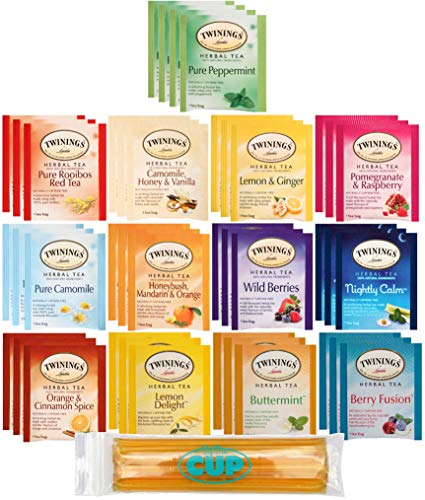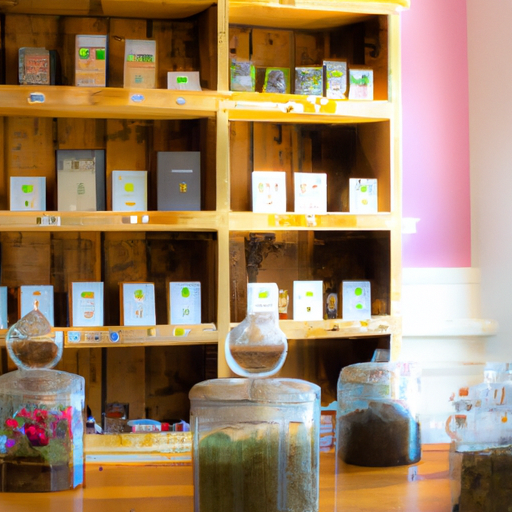Ah, the pesky cough. It’s an annoying symptom that frequently comes with a cold, making us feel miserable and yearning for some relief.
But fear not, for nature has provided us with a soothing solution: herbal tea. When it comes to soothing a cough, herbal teas can work wonders. From calming and relaxing options like chamomile tea to congestion-clearing and irritation-relieving peppermint tea, there’s a herbal tea out there for every cough.
Ginger tea not only fights inflammation but also boosts our immunity, while honey and lemon tea offers soothing and hydrating properties for our throats. And these are just a few of the many herbal teas that can provide cough relief.
In this article, we will explore the causes of a cough, as well as the benefits of various herbal teas for soothing this pesky symptom.
So, grab a cozy mug and let’s dive into the world of herbal tea and cough relief.
Key Takeaways
- Herbal teas, such as ginger tea, honey and lemon tea, chamomile tea, and peppermint tea, can provide relief for cough symptoms during a cold.
- Different herbal teas have different benefits, such as fighting inflammation, boosting immunity, soothing and hydrating the throat, and clearing congestion.
- Herbal teas are made from natural ingredients with cough-suppressing properties and can reduce throat inflammation and irritation.
- Sipping on herbal tea promotes relaxation, reduces stress levels, and can be a natural remedy for cold and flu symptoms.
Understanding the Causes of a Cough
So, when you’ve got a pesky cold and your throat feels scratchy, ever wondered what causes that annoying cough? Well, let’s dive into the first subtopic and explore the causes of a cough.
Common symptoms associated with a cough include a tickling or irritating sensation in the throat, chest congestion, and the production of mucus. It can be a sign that your body is trying to clear out irritants, such as dust or allergens, from your respiratory system.
In some cases, a cough can also be a symptom of a more serious condition, like pneumonia or bronchitis. If your cough persists for more than a week, is accompanied by high fever, chest pain or difficulty breathing, it’s important to seek medical help.
When it comes to managing a cough, cough suppressants can play a role. These medications work by blocking the cough reflex in the brain, providing temporary relief. However, it’s important to note that cough suppressants should not be used for prolonged periods without consulting a healthcare professional, as they can mask underlying conditions.
Now that we understand the causes and symptoms of a cough, let’s explore the benefits of herbal tea for soothing a cough.
The Benefits of Herbal Tea for Soothing a Cough
Additionally, incorporating a warm, soothing beverage into your routine can provide relief for a nagging throat irritation. Herbal tea, backed by research, has been found to be an effective alternative remedy for coughs. Here are five reasons why herbal tea can help soothe your cough:
-
Natural ingredients: Herbal teas are made from plants, such as ginger, peppermint, and licorice, that have compounds shown to have cough-suppressing properties.
-
Anti-inflammatory effects: Some herbal teas, like chamomile and eucalyptus, have anti-inflammatory properties that can reduce throat inflammation and ease coughing.
-
Hydration: Drinking herbal tea keeps your throat moist, which can help alleviate dryness and irritation, making it easier to relieve coughing.
-
Immune system support: Many herbal teas, such as echinacea and elderberry, are known to boost the immune system, helping your body fight off infections that may be causing your cough.
-
Relaxation: The act of sipping on a warm cup of herbal tea can have a calming effect on your body, promoting relaxation and reducing stress levels, which can indirectly help alleviate cough symptoms.
By incorporating herbal tea into your daily routine, you can experience the benefits of its natural ingredients, anti-inflammatory effects, hydration, immune system support, and relaxation properties. Chamomile tea, in particular, is known for its soothing and relaxing qualities, making it an excellent option for easing cough symptoms.
Chamomile Tea: A Soothing and Relaxing Option
Indulging in a warm cup of chamomile tea will transport you to a state of tranquility and calmness, leaving you feeling relaxed and at ease. Chamomile tea is not only a delicious beverage, but it also offers numerous benefits for soothing a cough.
One of the key advantages of chamomile tea is its ability to promote relaxation. By incorporating relaxation techniques into your routine, such as sipping on chamomile tea, you can effectively alleviate the discomfort associated with a cough. Studies have shown that chamomile tea can have a calming effect on the body, reducing muscle tension and promoting a sense of well-being.
In addition to its relaxation properties, chamomile tea is also considered one of the best alternative remedies for cough relief. It contains compounds that possess anti-inflammatory and antimicrobial properties, which can help to ease irritation in the throat and reduce coughing fits. Furthermore, chamomile tea is rich in antioxidants, which can strengthen the immune system and support the body’s natural healing process.
Transitioning into the subsequent section about peppermint tea, this refreshing herbal beverage is known for its ability to clear congestion and relieve irritation.
Peppermint Tea: Clearing Congestion and Relieving Irritation
When you’re feeling stuffed up and irritated, a cup of peppermint tea will work wonders in clearing your airways and soothing your throat. Here’s why peppermint tea is a great option for relieving congestion and irritation:
-
Menthol: Peppermint contains menthol, a compound known for its ability to relax the muscles of the respiratory system. This can help open up your airways and make it easier to breathe.
-
Anti-inflammatory properties: Peppermint tea has anti-inflammatory properties that can help reduce swelling and irritation in the throat. This can provide relief from coughing and soreness.
-
Antimicrobial effects: Peppermint has antimicrobial properties that can help fight off the bacteria and viruses causing your cold symptoms. By eliminating these pathogens, peppermint tea may help you recover faster.
-
Soothing and calming: The warm, aromatic nature of peppermint tea can have a soothing and calming effect on your throat and respiratory system, providing instant relief from cough and irritation.
In the next section, we’ll explore the benefits of ginger tea in fighting inflammation and boosting immunity. Remember, finding natural remedies like herbal teas can be a valuable addition to your cold-fighting routine.
Ginger Tea: Fighting Inflammation and Boosting Immunity
To enhance your immune system and reduce inflammation, incorporating ginger tea into your routine can be highly beneficial. Ginger tea offers a wide range of health benefits that can support your overall well-being.
One of the key benefits of ginger tea is its ability to fight inflammation in the body. It contains powerful compounds called gingerols, which have been shown to have anti-inflammatory effects. By reducing inflammation, ginger tea can help alleviate symptoms such as joint pain and stiffness.
Additionally, ginger tea is known for its immune-boosting properties. It contains antioxidants that help strengthen the immune system and protect the body against harmful pathogens. Drinking ginger tea regularly can help reduce the risk of infections and promote overall health.
Making ginger tea at home is simple and can be done with just a few ingredients. To prepare ginger tea, start by peeling and grating fresh ginger root. Then, add the grated ginger to a pot of boiling water and let it simmer for about 10 minutes. Finally, strain the tea and enjoy it hot or cold. You can also add a squeeze of lemon or a teaspoon of honey for added flavor and additional health benefits.
Transitioning into the subsequent section about ‘honey and lemon tea: soothing and hydrating the throat’, it’s important to note that ginger tea can be a great addition to your cold-fighting routine. However, if you’re looking for a tea that specifically soothes and hydrates the throat, honey and lemon tea might be a better choice.
Honey and Lemon Tea: Soothing and Hydrating the Throat
Sipping on a warm cup of honey and lemon tea can provide soothing relief for a scratchy throat, making it perfect for those dealing with seasonal allergies. This natural remedy has been used for centuries to ease the discomfort that comes with a cold or flu. Here are five reasons why honey and lemon tea is a go-to choice for soothing remedies:
- The combination of honey and lemon coats the throat, providing a protective barrier against irritation and inflammation.
- The antibacterial properties of honey can help fight off any infections that may be causing the cough.
- Lemon is rich in vitamin C, which boosts the immune system and helps shorten the duration of a cold.
- The warm temperature of the tea can help to loosen mucus and relieve congestion.
- Honey and lemon tea is hydrating, which is essential for maintaining healthy throat tissues.
Incorporating this soothing drink into your daily routine can provide much-needed relief from a nagging cough. However, there are other herbal teas to try for cough relief that can complement the benefits of honey and lemon tea.
Other Herbal Teas to Try for Cough Relief
If you’re looking for alternative options to soothe your throat, why not explore the world of aromatic and comforting herbal infusions? Herbal remedies have been used for centuries to provide relief for common ailments, including coughs. When it comes to natural cough remedies, herbal teas can offer a gentle and soothing solution.
One popular herbal tea for cough relief is chamomile tea. Chamomile contains anti-inflammatory properties that can help reduce irritation in the throat and promote relaxation. Its gentle flavor and calming effects make it a great choice for bedtime.
Another herbal tea to consider is ginger tea. Ginger has long been used for its medicinal properties, including its ability to alleviate coughs and cold symptoms. It can help soothe the throat and reduce inflammation, providing relief from coughing.
Peppermint tea is another herbal option that can provide relief for coughs. Peppermint contains menthol, which can help relax the muscles of the respiratory system and provide a cooling sensation in the throat. Its refreshing flavor can also help clear congestion and ease coughing.
When selecting herbal teas for cough relief, it’s important to choose high-quality, organic options to ensure you’re getting the full benefits of the herbs. Remember to consult with a healthcare professional if your symptoms persist or worsen. So why not give these herbal remedies a try and experience the soothing relief they can provide for your cough?
Frequently Asked Questions
Can herbal tea completely cure a cough caused by a cold?
Herbal tea can help shorten the duration of a cold and provide relief for a cough. The effectiveness of different herbal teas may vary, so it’s important to choose the right one for cough relief.
How many cups of herbal tea should I drink in a day to relieve a cough?
To relieve a cough, I would recommend drinking herbal tea throughout the day. How to make herbal tea for cough relief? Brew the best herbal teas known for soothing a cough, such as ginger or peppermint.
Can herbal tea be used as a preventive measure to avoid catching a cold?
Herbal tea can be a beneficial preventive measure against catching a cold. Its natural remedies for colds, such as boosting the immune system, soothing the throat, and reducing inflammation, make it a great addition to a healthy lifestyle.
Are there any side effects of drinking herbal tea for cough relief?
When it comes to using herbal tea for cough relief, it’s important to consider potential side effects. It’s also worth discussing the effectiveness of herbal tea compared to other remedies and possible interactions with medications.
Can children safely consume herbal tea for cough relief?
Children can safely consume herbal tea for cough relief. It is important to choose teas specifically formulated for children and consult a healthcare professional for proper dosage and guidance.
Conclusion
In conclusion, when it comes to soothing a cough, herbal tea can be a game-changer. Whether it’s the calming effects of chamomile, the refreshing qualities of peppermint, the anti-inflammatory properties of ginger, or the soothing combination of honey and lemon, there’s a herbal tea out there for everyone.
So why not embrace the power of nature and give these teas a try? They’re like a warm hug for your throat, providing relief and comfort when you need it most. As the saying goes, "A cup of herbal tea a day keeps the cough away!"










